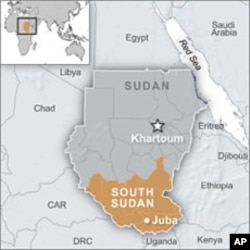The Carter Center is suggesting that next month’s Sudanese elections be postponed for up to 10 days.
The center has released its latest assessment on the vote, saying while much has been achieved in organizing the elections, the process remains “at risk on multiple fronts.” The elections are scheduled for April 11th through the 13th.
In Khartoum, Graham Elson, field office director for Carter Center’s mission in Sudan, says the National Elections Commission (NEC) faces many logistical problems.
“We know that they have over a period of time now consistently failed to meet key target deadlines on certain things,” he says, “and that that has resulted in them now having no spare time within the timetable to allow for anything else to go wrong.”
Current problems
Elson says delaying the elections for 9 or 10 days would help ensure that logistical and operational problems are resolved.
“One is the ballot papers that have been printed abroad. Because the NEC failed to deliver the art work to the printers in time, it means that obviously those ballot papers are now going to be late into the country,” he says.
The Carter Center says the NEC has frequently changed the number of polling stations that will be in operation.
“This means that certain equipment (that) was ordered in kit form early on,” he says, “now needs to be repacked and re-sorted to reflect the current number of polling centers and polling stations. Ballot papers equally need to be sorted and then packed in accordance with those new…numbers.”
Some states reportedly still haven’t finalized voter lists.
But would the NEC agree to delay the election?
“The National Elections Commissions is supposed to be an independent body. And if it decides that for operational and logistical reasons it needs to have a delay, it should be allowed to take that decision. And the state authorities, both in North Sudan and South Sudan, should respect the independence of the election commission and the decisions it takes in respect to the election date,” he says.
Other concerns
The Carter Center also raises concerns about political parties having to give 72 hours notice and get a permit for rallies, marches and meetings held in public areas.
Elson says informing authorities about such events is necessary to ensure public order and safety, but “the idea that one has to get a permit does not chime in with a proper democratic process.”
He says there’s also concern about state censorship of opposition candidate speeches, which might be critical of the incumbent president.
What’s more, there’s a lack of voter education.
“A good half of the population has never voted before. It’s quite a complex polling procedure. Voters have to vote on eight different ballot papers in the north of the country and 12 different ballot papers in the south of the country. There may well be some confusion in the voters’ minds as to how they exercise their democratic rights,” he says.
Such confusion, says Elson, could delay the voting process. As a result, the Carter Center says it may be wise to extend voting for a fourth day.
Things have been relatively peaceful during the first month of the campaigning. The center calls on the NEC and authorities to ensure things remain that way and to quickly address any alleged voting violations that may arise.
The center estimates about 16,000 people are contesting for the more than 1800 parliamentary and executive seats.




